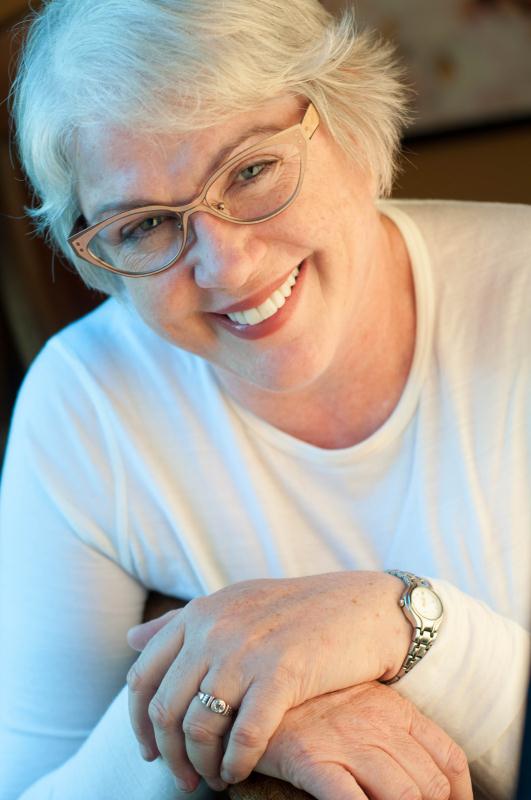Cervical Cancer Survivor
Laugh, Hope, and Savor Every Moment
 Writer, actress and comedian Julia Sweeney was already immersed in what she refers to as “The Fog of Cancer” when she received her cervical cancer diagnosis. It was 1995, and she was focused on caring for her brother, Michael, who had late-stage lymphoma. The Saturday Night Live alum drew on her innate sense of humor to help her heal. She hopes, in turn, to help others see the power of laughter even in the face of cancer.
Writer, actress and comedian Julia Sweeney was already immersed in what she refers to as “The Fog of Cancer” when she received her cervical cancer diagnosis. It was 1995, and she was focused on caring for her brother, Michael, who had late-stage lymphoma. The Saturday Night Live alum drew on her innate sense of humor to help her heal. She hopes, in turn, to help others see the power of laughter even in the face of cancer.
Julia Sweeney, who may be best known for her role as the androgynous character “Pat” on Saturday Night Live, believes that her brother’s cancer diagnosis actually made hers easier. It was toward the end of his life that she was diagnosed.
“I’d learned a lot about cancer during Michael’s ordeal. I was in what I term ‘The Fog of Cancer,’ which means I was alert to any mention of it – on the news, in common conversation, in magazines – cancer everywhere! I felt I was in a world of cancer, so getting it myself didn’t seem out of place. I had this attitude that we were all going to get cancer eventually. Looking back, that doesn’t make sense,” she admitted, “but at the time it did.”
The fact that her cervical cancer was caught early and, according to her doctor, was unlikely to be life-threatening also helped.
“I had a conviction that I would live through this,” she revealed, “and that gave me a lot of confidence. So, for my own cancer, I didn’t need much hope. I knew the statistics were on my side, and I understood what I needed to do. After all, my cervix was something I could lose. It wasn’t a requirement for living, unlike my lungs or my liver.”
Her brother was living with her so she could help take care of him. Her parents also moved in while he was in treatment — “to help.”
From diagnosis on, Julia was able to recognize the humor in the situation.
“How absurd was it that my brother and I both had cancer? And to have my parents move in? I just knew they were going to drive me crazy for a long, long time — and maybe never ever leave my house.”
Although Julia found so many things funny, she also found certain aspects to be devastating.
“Believe me, I spent time being truly sad. I really needed hope when Mike’s cancer was progressing. He was clearly declining physically even when his numbers sometimes were moving in a positive direction. I guess I found hope in hope itself. Feeling hopeful is a balm. I tried to just be present and be calmly hopeful for him. I tried to savor each hour I had with him, be hopeful and help him be hopeful.”
Julia and Michael were surrounded by support, but she discovered that sometimes having support can come with a side of stress, too.
“My parents were loving and well-meaning people (my father died in 2004), but it was stressful to have them in my house. They were supportive in many ways, but there was a trade-off because they were hard to be around all the time.
“I also had a great group of friends. However, I felt pressure to make sure they felt like they were supportive, and that became stressful, too.”
Julia’s doctor recommended a treatment plan that included a hysterectomy followed by radiation therapy. Three weeks after Michael passed away, she had the hysterectomy. Her doctor offered the options of either four, six or nine weeks of radiation. She opted for nine because she felt it would do the most to lower her chances of recurrence. The treatment was successful, and she didn't suffer any long-lasting problems from the radiation.
After her hysterectomy, Julia looked to adoption and became a mother to her daughter Mulan.
“I always knew I wanted to be a mother. I’d always been attracted to adoption, so not being able to bear a child wasn’t hard for me. And it worked out so wonderfully. I have a great daughter. I feel fulfilled by my need to mother through her, and we have a great relationship.”
Julia has remained cancer-free and is diligent about preventive care.
“Mulan got the cervical cancer vaccine as soon as she was the right age. I told her that if this vaccine had been available, I may not have had cancer. And, if she gets the cancer I had, she may never be able to have children.
“Of course, it’s because I got this cancer that I am her mother!” she laughed. “But you know, that’s how life goes. She wants to have children herself and I want her to be able to. She understands this vaccine could help in that regard.
“My advice to cervical cancer survivors: slow down. Be present. Read. Look at the sky at night. We are so lucky to be alive and conscious. Do what you can to live longer, and then savor every moment.”


